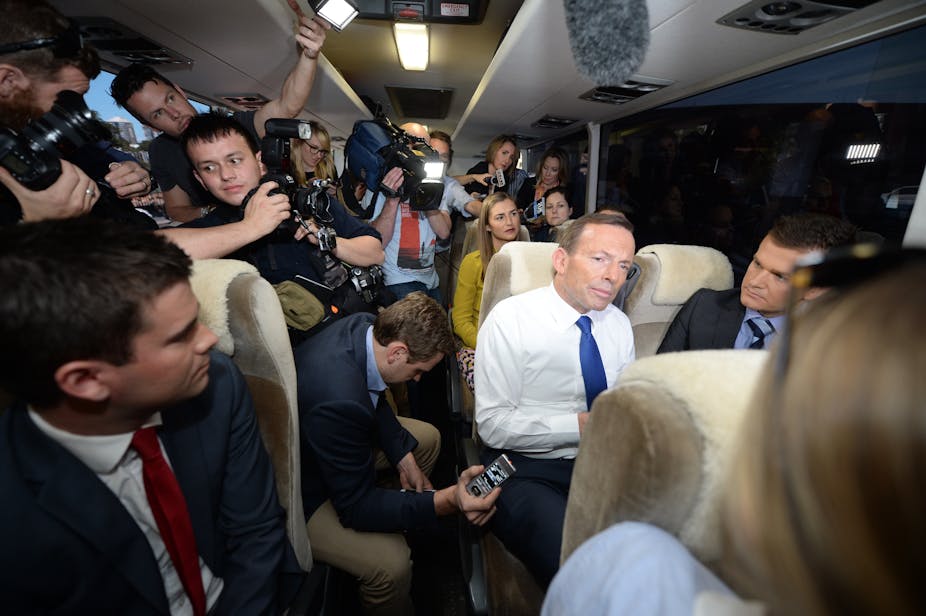Is Tony Abbott really trying to gag his ministers when, under the Howard government, he and his ministerial colleagues enjoyed relative freedom to handle media interviews and issue press releases?
This question first arose when an email from Abbott’s press secretary James Boyce was leaked to the Australian Financial Review late last month. The email stated that “all media coordination and requests should go through Kate [Walshe] first”. The list of media opportunities included all national media interviews on television, radio and print, and in particular made reference to the Sunday programs, Sky News, and metropolitan print media longer-format interviews.
My immediate reaction when reading the reports was: what about Abbott’s strategy was new?
At his press conference on September 16, Abbott stated his frontbench was “one of the most experienced incoming ministries in our history”. As many have served in the Howard government they would well understand the reasons behind this decision.
Abbott’s media directive is all about co-ordination, not control. It relates to national media appearances rather than, for example, interviews in an electorate with a local newspaper. If we reflect on how John Howard and his press office managed media requests, this is exactly what happened. The process is seamless and is not meant to inhibit or restrict ministers’ media appearances.
Howard gave his ministers a great deal of freedom and latitude, and was described as a “hands-off” prime minister. Ordinarily, contact between a minister’s press secretary and Howard’s press office was frequent and very professional. Co-ordination of media appearances on the Sunday morning political programs was essential, as were the scheduling of major announcements and media conferences. Another aim is to ensure comments ministers make are accurate and consistent with government policy or a position on any issue.
As a matter of course, the prime minister’s press office would be advised in advance of media opportunities arising, so clashes of ministerial appearances were avoided. A minister’s press advisers were also briefed on issues that could potentially be raised by journalists and commentators. Occasionally, Howard himself would call a minister to give advice or offer encouragement prior to a minister’s media appearance.
Howard’s leadership group, which met every morning at 8:30 during sitting weeks, would also discuss media strategies, issues likely to arise during the day, how they should be handled and who should do the media.
Overwhelmingly, Howard’s press office was used by ministerial staff as a sounding board. This I see is the situation that will evolve in Tony Abbott’s press office. In the course of my PhD research, Tony Abbott told me himself:
I always encouraged my press people to have the closest possible links with the prime minister’s press office…[they] should talk to the leader’s office at least once a day.
Howard’s ministers were also quick to advise the press office or prime minister himself if there was likely to be media interest in a looming crisis or incident they were dealing with.
One Howard government minister described the press office operation as:
…effective without being dictatorial…it still gave you freedom to go and do what you needed to do and to make your judgements about what you needed to do. It was a more soft touch kind of co-ordination.
I would suggest this is similar to how Abbott’s press office will run.
Another interesting Abbott decision is to release information on asylum seeker boat movements only once a week. This followed immigration minister Scott Morrison’s edict that he and Lieutenant-General Angus Campbell will only give weekly media briefings about Operation Sovereign Borders, and monthly updates on detention and bridging visa statistics for asylum seekers who arrive by boat.

Coupled with this decision was the incident that occurred on AFL Grand Final day. After addressing a sporting function, Abbott ignored journalists’ calls for a comment on the deaths following an asylum seeker boat sinking off the Indonesian coast. The incident occurred as Abbott was being quickly escorted by his security team through an underground carpark. The location itself was probably not an appropriate venue for a media scrum, particularly about such a tragic event.
Should Abbott have at least issued a statement, despite the fact that it was a defence operational issue and when the boat sunk it was in Indonesian waters, just 50 metres from shore? I would have thought Howard would certainly have spoken to the media, even to simply offer his condolences. Scott Morrison eventually did issue a statement.
Finally, Abbott reportedly banned all but Australian reporters from a press conference he held in Jakarta on October 1 as part of his Indonesia visit. This move outraged Indonesian journalists. Indonesia’s Alliance for Independent Journalists called the move “not just discourteous but criminal”. Why would Abbott create so much angst, and what was the benefit?
The reason I am told the Australian media contingent were given exclusive access to the prime minister was to allow journalists to ask very specific questions about the outcomes of Abbott’s discussions without having to contend with an enormous number of Indonesian press also clambering to ask questions. The Australian media - having paid to travel to Jakarta - surely deserve the right to scrutinise the prime minister through the eyes of a domestic audience.
In isolation, these two incidents would probably not rate a mention. However, coupled with that press office directive to ministers, some believe that a pattern is emerging of cover-up and secrecy. I don’t believe that to be the case. Howard was always willing to be questioned and grilled by people like Neil Mitchell, Alan Jones and Kerry O’Brien, and Abbott will most likely follow Howard’s example.
As technology has developed so rapidly - and with the plethora of new communication platforms having emerged since Howard’s last year in office in 2007 - there is no longer any place to hide for politicians.

